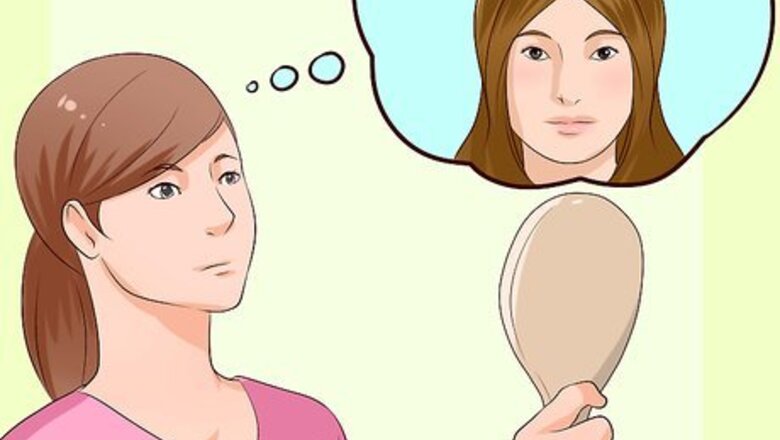
views
Looking Inward
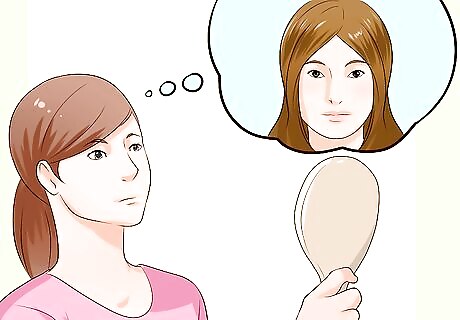
Ask yourself why you want to improve your appearance. Are you doing this for yourself or someone else? What do you hope to achieve by improving your appearance? If you’re trying to change how you look with the hopes of attracting someone, be careful that you stay true to yourself as you go through the following steps. Only do what feels right for you.
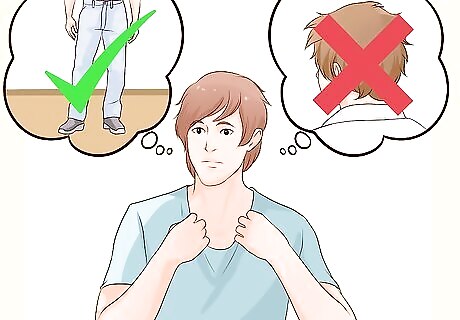
Identify what you like and what you don’t like about your appearance. Most of us find it easier to identify what we don’t like about ourselves, but it’s important to identify some good things, too. Once you figure out what you like best about yourself, think about how you can play it up.
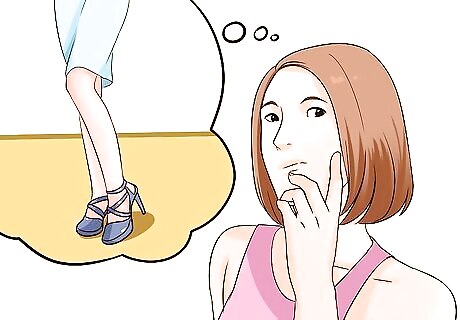
Be realistic about what you can and can’t change. You might find it useful to make a list of what you like and don’t like, and then realistically consider what you can actually change about yourself. For example, you can’t change that you’re short, but if you want to, you can give the illusion of looking taller by wearing high heels (women) or shoes with thicker heels (men or women). There are also things you can do with your clothing and hair to help give the appearance of length (for example, if you’re short, you might want to avoid having very long hair or wearing long jackets that reach below the knees, as these things can make you look shorter).

Learn to love your quirks. Maybe you hate most of how you look, but your appearance isn’t only about how traditionally attractive you are. As you work through the following steps, try to move at least one thing from your “don’t like” list to your “like” list. Maybe you hate that your hair is so thick, but with the right hair cut, products, and styling, you might be able to turn that around and really love what you can do with your hair.
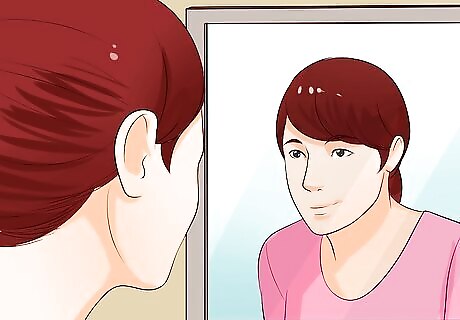
Be true to yourself. Ideally, improving your appearance is about letting your true self shine through. It’s not about fitting a standard ideal of what attractiveness is to society in general. As you work on improving your appearance, keep this in mind. Maybe you feel most like yourself with your natural hair and skin tones, wearing neutral clothing. Maybe you feel most like yourself with colorfully dyed hair, piercings, and hand-made, one-of-a-kind outfits. Don’t let society dictate what the best version of you looks like. You are the expert on you. Selena Gomez Selena Gomez, Founder, Rare Beauty Celebrate your unique beauty. "From the time I can remember, I’ve always felt like I had to be perfect or look a certain way. It took me a long time to realize that I only wanted to be myself – that what made me unique was also what made me beautiful."
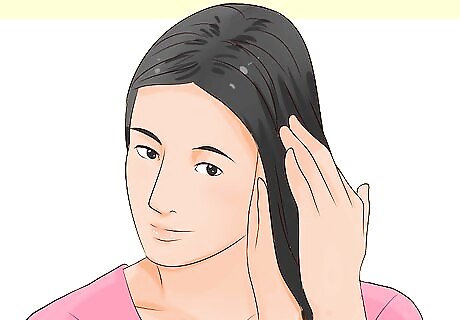
Be gentle with yourself. For some of us, feeling better about our appearance might be as simple as getting a new haircut; for others, it might be a much longer, more difficult process. Know that we have all struggled with self-confidence and maintaining healthy habits. The key is to stay positive and, most importantly, be kind to yourself. If you decide that part of your plan to improve your appearance is to exercise more often, being gentle means being realistic about what you can do — for example, if you don’t exercise regularly, start with two days a week and move up from there. Being gentle also means that when you miss a day or make a mistake, you don’t get mad at yourself; you just acknowledge it, forgive yourself, and make a commitment to start fresh tomorrow.
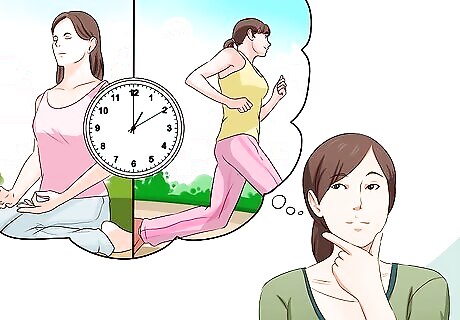
Make a realistic action plan. Having a clear sense of your goals will help you stay focused and on track. When making your action plan, be careful not to set too many goals for yourself at one time. If you make too many changes at once, you’ll risk becoming overwhelmed and not being able to keep up with any of them. If you decide you want to lose weight, improve your skin, and sleep better, you’ll likely need to implement these changes to your lifestyle in stages. For example, you might start by exercising twice a week and committing to washing your face twice a day with an appropriate cleanser (i.e. one for your skin type — dry, normal, combination, acne-prone) for the first one or two weeks.
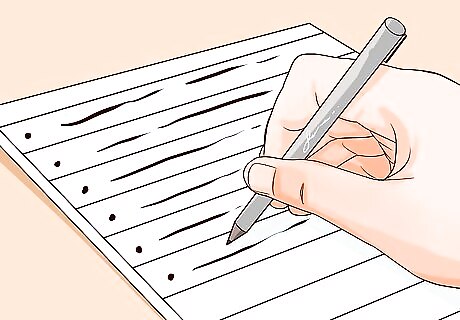
Write it down. As you consider your motives and plans for improving your appearance, keep track of your thoughts and feelings in a journal. Devote a journal to improving your appearance. Write your action plan down in the journal so that you can refer back to it. Continue to keep your journal as you develop new habits for improving your appearance. This will help you evaluate what works and what doesn’t.

Be realistic and patient. Unless you have unlimited funds and are willing to undergo surgery, your results won’t be immediate. To improve your appearance in the long term requires long-term lifestyle changes. Give yourself the time and space you need. Know that this will be different for everyone depending on their individual goals and situations.
Getting Healthy
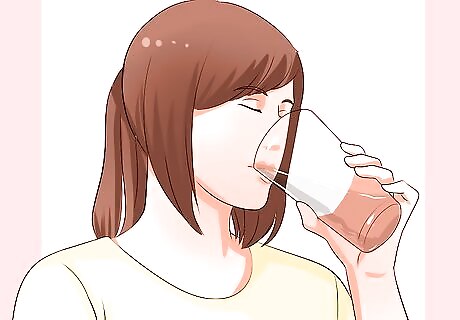
Drink enough water. Most people don’t drink enough water. Staying hydrated will not only improve the quality of your skin; it will help keep you focused and energetic, and it might even help you shed a few pounds. Advice for how much water to drink varies, but the average is 8 (8 oz.) glasses per day. To verify that you are properly hydrated, check that the color of your urine is clear or very lightly colored, not dark. Dark urine indicates severe dehydration.

Eat healthfully. Eating healthfully means different things to different people, and really depends on your body chemistry. In general, you’ll want to ensure you’re getting enough protein (i.e. lean meats or alternatives, nuts), healthy fats (i.e. extra virgin olive oil, avocados), and other nutrients from fruits and veggies, and you’ll want to avoid processed foods and sugars as much as possible. If you are lactose intolerant, vegetarian, vegan, celiac or have any other specific dietary requirements, you might even find it useful to consult a nutritionist about the best diet for you. Note that changing your diet is not the same thing as dieting. Unless you’re working with a doctor to decrease your weight significantly, avoid cutting calories or cutting out otherwise healthy foods to lose weight. Diets are infamous for being unsuccessful; when you’re starving and exhausted from a diet, you have less energy and will power to stay on it.
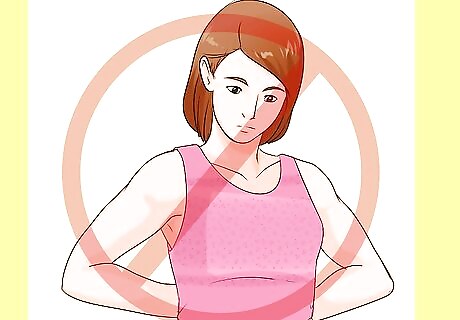
Focus on your health and how you feel; not your weight. Instead of looking at the scale every morning, think about how your bones feel, how your brain feels, how energetic you feel. You should find that over time, unless you’re struggling with a medical condition, these things will improve as you make healthy changes. If you’re struggling with a medical condition, be sure to consult your doctor and get their approval before implementing any changes to your lifestyle. If you’re 5’11 and you’ve read that your favourite actor or actress is 110 pounds, be realistic. Being 5’11 and 110 pounds is not healthy. You will be skin and bones!
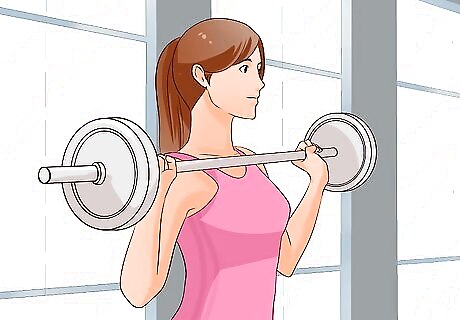
Exercise. Choose physical activities that you enjoy and that work for your body, and implement them slowly into your lifestyle. If you already work out twice a week, find a way to fit three days a week into your schedule. Ideally you'll want a blend of flexibility, strength, and cardio. Ultimately you’ll want to work up to being active for at least 30 minutes each day, with longer, more intense workouts 3-5 days each week. By choosing activities that you enjoy, exercising will feel less like work, and more like a reward. Take a dance class or join a team sport! If you have knee problems, don’t decide that you’re going to start running; swimming would be more appropriate.
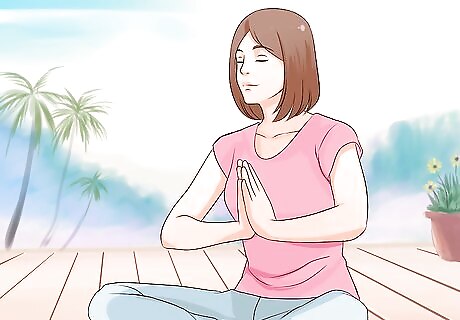
Meditate. Meditating helps you get more in touch with your mind and body. It will not only help you stay focused on your goals, but will also help you foster a sense of inner peace and tranquility, making it easier for you to accept yourself as you are, no matter where you are in your journey.
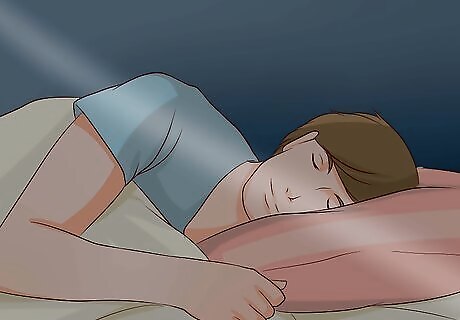
Get enough sleep. When we regularly don’t get enough sleep we are not our best selves. It shows in our mood, body language (hunched back, droopy eyelids), and skin (dark eye circles, bags under eyes), and can make us appear less attractive. Aim for between 7 and 9 hours of sleep each night, and try to be consistent in your bedtime (for example, sleeping from 11 p.m. to 7 a.m. consistently). If you have trouble sleeping, you might find progressive muscle relaxation helpful. Lying in bed before sleep, close your eyes and take some deep breaths, drawing an awareness to your body. Beginning at the top of your head and working down your body, tense your muscles and then release them. An appropriate order would be as follows: forehead, eyebrows, eyes, cheeks, nose, mouth, jaw, neck, shoulders, upper arms, forearms, hands, fingers (make a fist), chest, upper stomach, lower stomach, pelvis, buttocks, thighs, knees, calves, ankles, feet, toes. Once you’re done, tense your entire body and hold it for a moment before letting go. For those of us that work at home, it can be difficult to transition from work to sleep, especially if the home is small/a specific office space is not available. If you suffer from insomnia, it’s important to dedicate a specific area to sleep, and only sleep. Don’t bring your work into this area. Make your bed your sanctuary. Oils and herbs might also be helpful in relaxing you before sleep. These can vary from essential oils such as lavender and neroli to herbs like valerian root. If you choose to take supplements, consult your doctor or specialist to ensure that they are safe to take with anything else you may be taking, or with any medical conditions you may have.
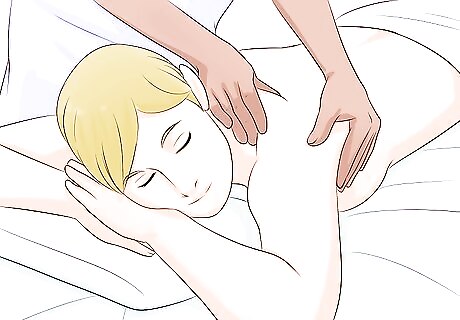
Treat yourself. If you’re working to improve your appearance, you may be struggling with some body confidence issues. Even if you aren’t, you may find that improving your appearance is a difficult journey. Make sure that you take time to reward yourself for your hard work. Rewards could include buying a nice article of clothing or treating yourself to a spa day, or even buying that video game you like (as long as it doesn't take away from the time you spend exercising!) or saving up/paying for that pricey exercise class/club membership you’ve been wanting.
Improving Your Complexion
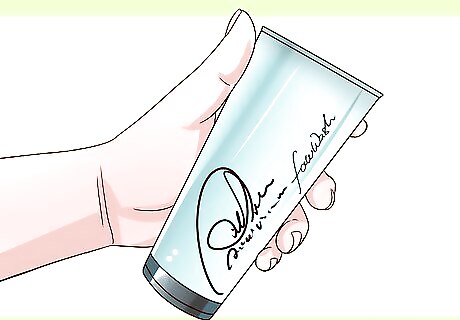
Buy a face wash that is appropriate for your skin type. Most drugstore brands make this easy by explicitly stating on their labels which skin type their cleanser is designed for. You’ll likely see one of four types: normal (occasional zits but no problem areas), combination (often a combination of dry on cheeks, oily on forehead, nose and chin), oily/acne-prone, and dry/sensitive (some flakiness, often sensitive to scented cleansers).
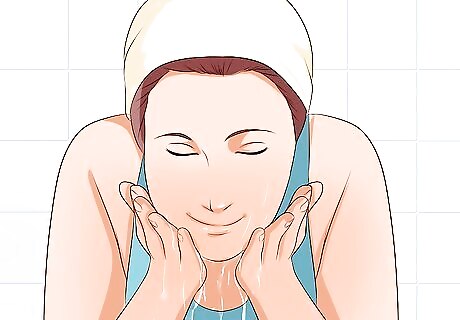
Wash your face twice a day. While washing your face, be gentle. Avoid scrubbing too hard, as this can irritate your skin and cause blemishes or make existing blemishes worse.
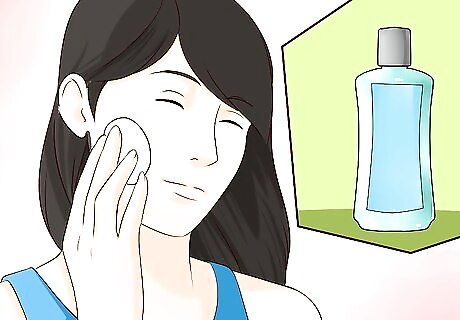
Use a skin toner after washing your face. After cleansing, gently apply a toner using a cotton pad. Toners help you balance your skin’s pH (acid-alkaline ratio), and can keep your skin looking healthier. Avoid toners that contain alcohol, as this can dry out and irritate your skin.
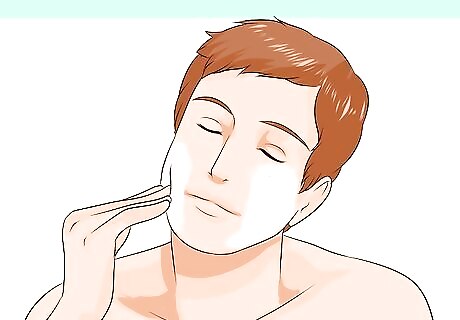
Apply a moisturizer after washing and toning your face. As with facial cleansers, most drugstore moisturizer brands will specify which skin type they are designed for on the packaging.
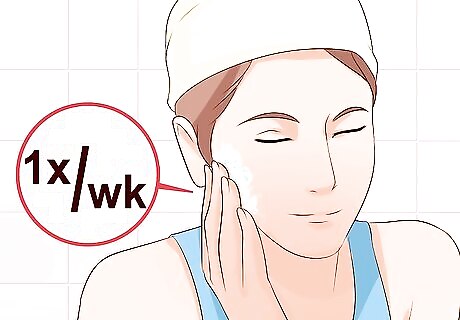
Exfoliate once a week. Exfoliating removes dead skin cells and brightens your skin. If you have severe acne, you’ll probably want to avoid exfoliating all together, as the friction can irritate your skin and the exfoliant can spread the bacteria from your pimples to other areas of your skin.
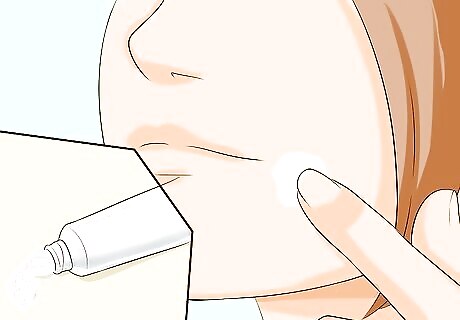
Buy a pimple cream. You may wish to have tea tree oil or a cream containing salicylic acid handy in case you get zits. Do not try to pop your zits, as this will only make them worse.
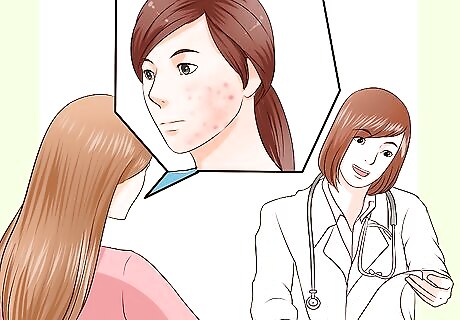
Treat severe acne. If you have severe acne and are really struggling to get it under control, consider seeing your doctor and/or a dermatologist. A professional can help you address your acne and come up with an action plan to reduce or even get rid of it. You might find that the doctor/dermatologist recommends a medication, topical cream, or a combination of both. If you’re a male and you shave your face, try shaving in the same direction as your hair growth to avoid breakouts caused by irritation.
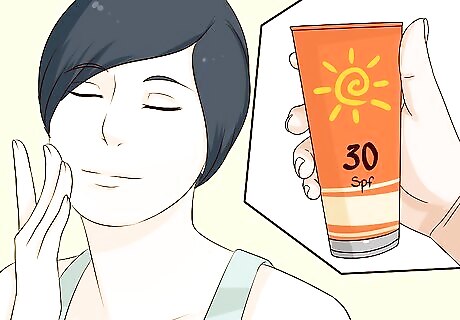
Wear sunscreen. Many facial moisturizers include an SPF of 15 to 30. Keep an eye out for the words “SPF 15” or “SPF 30” on the label. When purchasing sunscreen, especially for your face, be careful to ensure that it won’t clog your pores (i.e. that it is non-comedogenic). Avoid sunscreens containing oil.
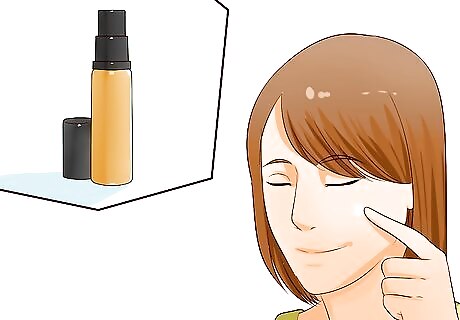
Apply a concealer to your face. If you feel really self-conscious about your complexion, consider trying a tinted moisturizer or concealer. These are available for men and women. Aim for something that is non-comedogenic (won’t clog pores), and directed at your skin type (i.e. normal, combination, oily/acne-prone, dry/sensitive). To target a pimple or any other redness on your face, you can try putting a dab of green cover-up on there before going over it with one that matches your skin tone. Note that wearing makeup can exacerbate acne, although some brands do claim to help fight it.
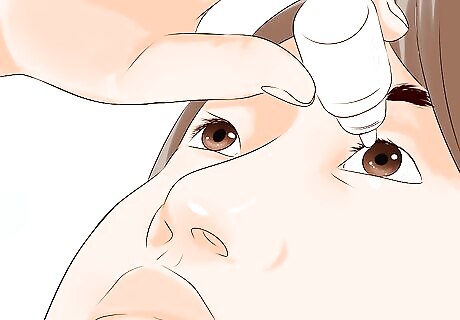
Get clear eyes. Compliment your nice complexion with clear eyes. Reduce puffiness and dark circles with creams and/or a concealer. Reduce redness with eye drops. If you have any medical conditions related to your eyes, check with your doctor before using eye drops.
Smelling Wonderful
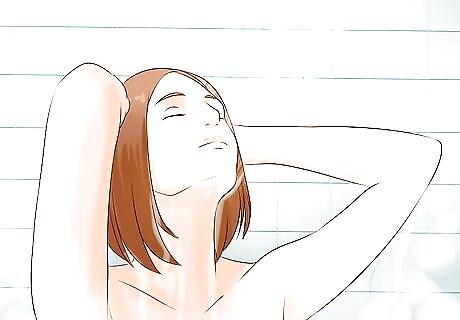
Shower daily. Unless you have extremely dry skin or some other condition or living situation that prevents you from doing so, shower every day. Pay attention to ensure that you thoroughly wash and rinse your body, particularly the parts that get more sweaty (i.e. your armpits and genitals). When selecting a soap it may be tempting to go for something that smells great, but strong-smelling soap can irritate skin. You’re safer purchasing an unscented soap or something designed for your particular skin type (for example, if you have oily skin and have acne on your back, you may want to seek out a soap designed for oily, acne-prone skin).
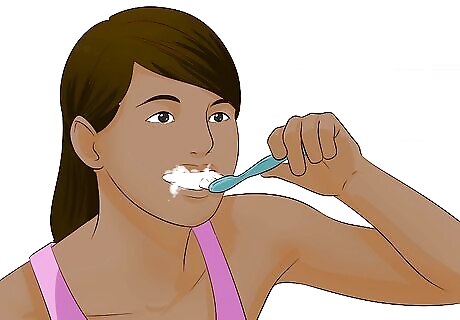
Brush your teeth at least twice a day. If your teeth are healthy and the enamel is not thinning, you can use a whitening toothpaste. If your teeth look a little translucent, you’ll likely want a toothpaste for sensitive teeth that advertises enamel repair.
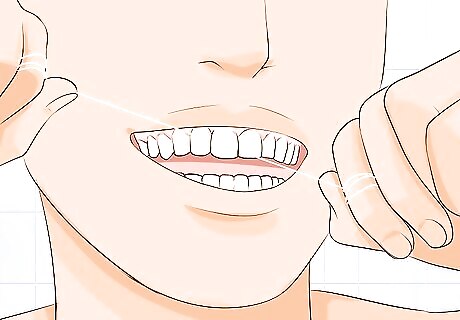
Floss your teeth at least once a day. This will remove food and plaque from your teeth, keeping them healthy and keeping your breath better.
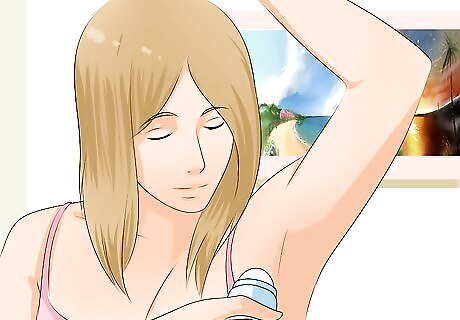
Wear deodorant. There is a huge selection of deodorant available for a variety of purposes. If you are more health conscious you may choose to avoid antiperspirants containing aluminum, which studies have suggested can cause cancer.
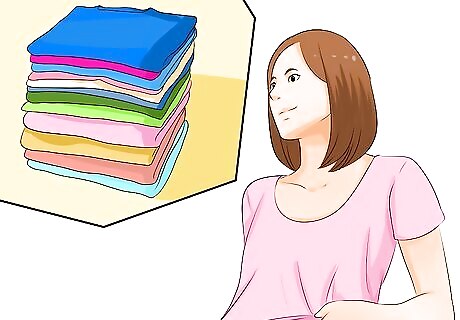
Wash your clothes regularly. Ensure that your clothes are clean and, if necessary, pressed (i.e. dress shirts, slacks will likely need ironing after washing). A good rule of thumb is to wash undershirts, underwear and exercise clothes after each wear (with the exception of bras, which you can wear several times before washing); wash tops after one or two wears, depending on how much you perspire; wash pants after five or six wears; and coats every one or two months. Washing your pajamas regularly (after three to four wears) may also help you avoid acne, if you have it in places other than your face.
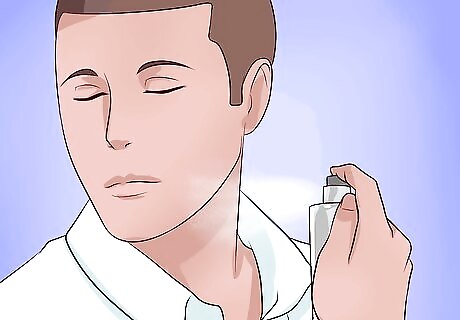
Wear perfume or cologne. Find something that feels unique to you — your own “signature scent”. Different scent categories suit different body chemistries: you’re best off going to a drugstore or department store that sells perfume and cologne, and sampling the scents until you find one that works on you. Be sure to give it at least an hour after spraying on your skin, as the scent can change over time. Scents come in several categories of smell: aromatic (grass-spicy), chypre (moss, patchouli, bergamot), citrus (tart scents like grapefruit or mandarin), floral (freshly picked flowers — note that floral and fruity can often overlap), leather (smoky, tar, combined with floral and tart scents), oriental (musk, vanilla, resin, wood combined with florals and spices), and woody (warm, sandalwood, dry/sharp cedar, balmy often combined with aromatic and citrus). Be careful not to wear too much cologne or perfume. In this case, too much is far worse than not enough. If you’re unsure of how much to put on, start small, with only a few spritzes. You might even try spraying it in front of you and then walking through it.
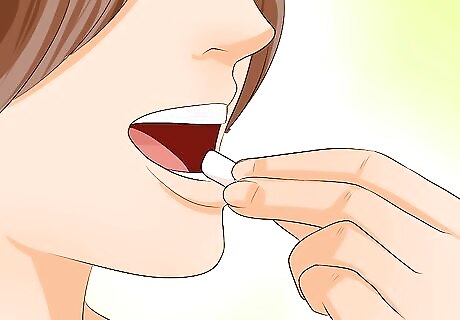
Freshen your breath. If you’re about to meet with someone and are self-conscious about your breath, consider popping a couple of mints in your mouth or using a breath spray. If you choose to chew gum, ensure that you spit it out before entering any important meetings, as many people find gum chewing to be rude and/or annoying — some even see it as demonstrating a lack of class.
Dressing Well
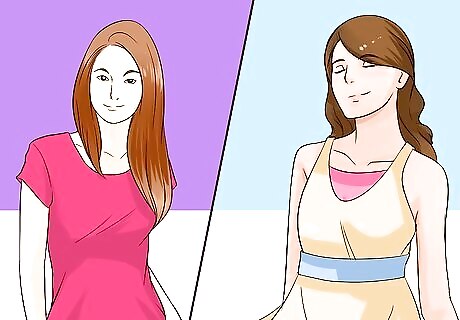
Define your style. Maybe you’ve already got a good sense of who you are and how you want to represent yourself. If you don’t, you might find it useful to start a style diary or even an online folder of styles that you like. When defining your style, consider the clothes and hair (and, if you wear it, makeup) that will best represent YOU. Are you edgy or more subdued? Are you extroverted and like a lot of attention? Or, do you like attention but would prefer to wear neutral clothes and then surprise people with your personality. Take a look through your closet—are there any styles, fits, or colors that you tend to gravitate toward? This can help you get an idea of your personal style. It's sometimes necessary to acknowledge that finding a style that is true to you is not always possible, whether due to financial or work constraints. For example, if you’re a nurse, you’re limited to a specific style of uniform; you may be able to show your personality through the patterns that you choose for that uniform, though.
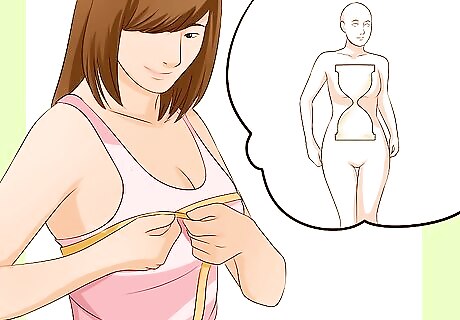
Figure out your body type. Figuring out your body type will help you decide which cuts look best on you, and which parts of your body you might want to accentuate. Body types are different for men and women. In general, women have four body types: apple (top heavy, with big busts and thinner legs), straight/rectangular (waist and hips are roughly equal, “boyish”), pear (bottom heavy, with hips significantly larger than bust), and hourglass (equal hip and bust measurements, with a narrow waist). In general men have four body types too: average (with broad shoulders tapering down to the waist), inverted triangle (athletic, with moderate to heavy muscle definition), rectangular (skinny or narrow in build, with the waist and the shoulders being the same width), or the triangle (a more pronounced midsection with narrower shoulders).
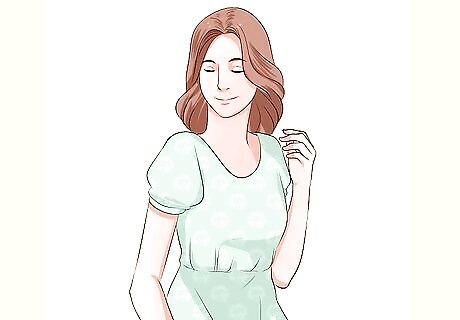
Dress for your body type. Use clothing to accentuate the things you like about your body. For many women, this means accentuating their waists, busts, backsides, or legs; for many men, this means accentuating broad shoulders, a strong chest, or a nice backside. If you’re a woman and you have an apple body type, you’ll likely wear something that accentuates your slender legs and draws attention away from your broad shoulders or thick middle. If you’re a man with a triangle body type, you’ll want to try to make your shoulders look broader and your midsection look narrower; structured, simple shirts are your best bet. Opt for clothes that fit you well. Don't wear clothes that are way too big or too small. Also, when you're buying jeans that contain lycra or spandex, go down a size—that way, they'll still fit once they stretch out.

Wear colors that complement your skin tone. Many variations exist within the two basic categories of “warm” and “cool” skin tones, but figuring out whether you’re warm or cool is a great starting point. If you have a warm skin tone, you’ll have yellow undertones. Warm skin tones often have greenish veins. Warm-toned people look good in earthy shades: burnt orange, cream, sunny yellow, brown, dark green, autumn red. If you have a cool skin tone, there’ll be pink undertones. Cool skin tones often have blueish veins. Cool-toned people look good in “cool” colors: black, royal blue, navy, gray.

Clean out your wardrobe. Once you’ve defined your style and figured out what clothes look best on you, go through your entire wardrobe and get rid of anything that doesn’t look great on you. This includes workout clothes and sleepwear, if you can afford it. Improving your appearance is largely about improving your confidence, so it’s important to ensure that you always feel good about how you look — even if you’re just in your PJ's. If you’re unsure of what to get rid of and what to keep, invite a friend or two over to give you advice. You can make a night of it by offering to get them dinner in exchange for their help.
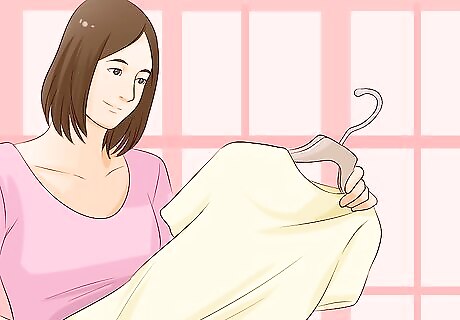
Only buy clothing, shoes, and accessories that make you feel fantastic. It’s tempting to buy things on sale, but you can save money by only purchasing what looks best on you. Look for great basic pieces that you can mix and match with clothing you already have. When you buy shoes, be sure they fit comfortably! It's hard to be stylish in shoes that are too tight or too big. EXPERT TIP Alena Le Blanc Alena Le Blanc Personal Stylist Alena Le Blanc is the Personal Stylist and the Founder of Le Blanc Label. Based in San Francisco, California, Le Blanc Label is the leading personal stylist brand for sustainable style transformations. Alena and her team specialize in seasonal wardrobe refreshes, closet edits, styling for special events, travel, photoshoots, and general personal needs. Alena has been featured in podcasts including EMPOWERED BY WMN, I Am Fearless, and Mind Power Meets Mystic. Alena received her BFA in Fashion and Apparel Design from the Academy of Art University. Alena Le Blanc Alena Le Blanc Personal Stylist Invest in well-made garments. Choose clothes made of high-quality fabrics like wool, silk, and cashmere. They last longer and exude luxury. Look for clean stitching, smooth seams, and a well-tailored fit. Focusing on clothes of this quality will help you build a personal style that conveys understated elegance.

Get help. Ask a friend or two to come along with you when you go out shopping for new clothes. If you’re really struggling to figure out what looks good on you, and if you can afford it, you might even consider paying for a personal shopper to help you out.
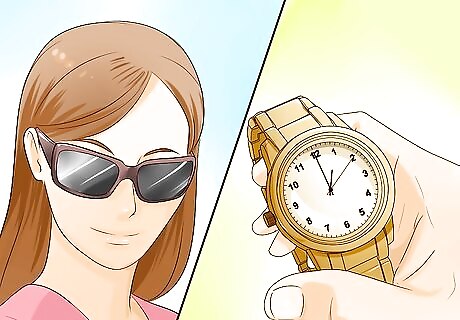
Don’t forget the little things. Accessorize with watches, sunglasses, ties, necklaces etc. Keep your nails trimmed/manicured and, if it’s something you're into, paint them to match your outfits. It’s the small touches that really cement your style. For example, maybe you always wear black, but bold accessories. For a woman this might mean a big, chunky, bright necklace with bright lipstick. For a man this might mean a brightly patterned tie with vintage cuff-links.
Getting Great Hair
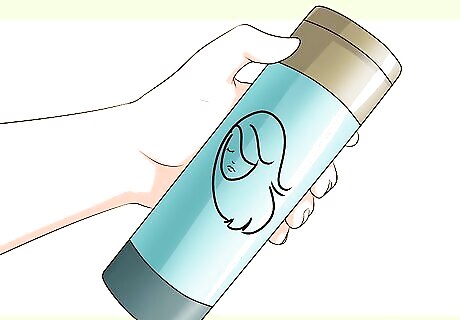
Buy the right hair products for your hair type. Is your hair thick or thin? Is it dry, oily, or somewhere in between? Is it colored? Curly? Straight? All of these things will influence which hair products you buy, and thankfully most brands (both drugstore and professional) tell you right on the label exactly which hair type they are designed for.
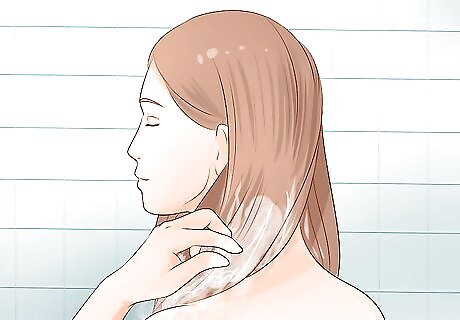
Wash your hair as little as possible. Figure out how often you need to wash your hair to keep it looking clean (it needs to be washed when it’s oily, flat, and separating), and do that — don’t wash it more than it needs to be washed, as this can dry it out.
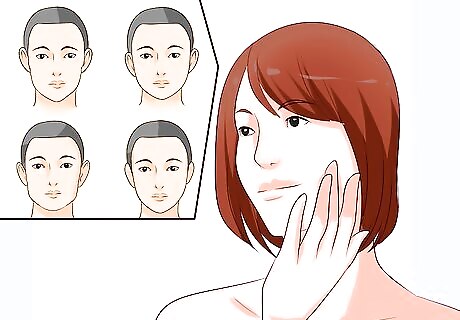
Figure out your face shape. Facial shapes include square or circle (face as wide as it is long, with square faces having angular chins), oval (face longer than it is wide), or heart-shaped (chin comes to a point, hair line on forehead may be a widow’s peak).
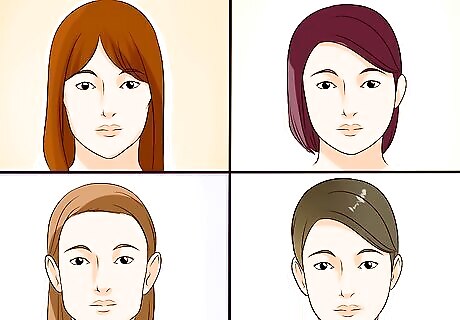
Select a few hairstyles for your face shape. Look online or purchase a hairstyle magazine at your local drugstore to find some examples of hairstyles that you like and that match your face shape. A square face can look great with a more edgy, angular cut such as a chin-length bob. Softer layers can also work. An oval face will look more balanced with layers, no matter the length. Bangs can also give the long, oval face a more balanced appearance. Heart-shaped faces often have great high cheekbones. Accentuate those with short layers or long bangs.

Be realistic. If you have thin, straight hair and you want a cut that requires thick, curly hair, think again. Even the most talented hairdresser is not a magician; they cannot completely change the quality of your hair.
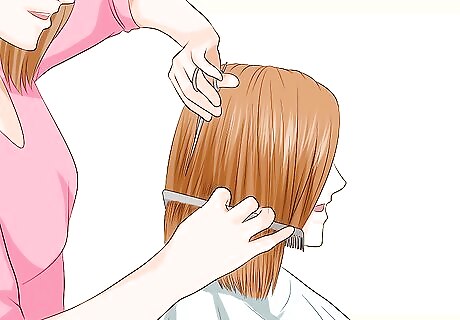
Get a good quality haircut. Ask around and/or look online to find well-reviewed hairdressers in your area. Bring photos of your selected haircuts/styles in with you to your appointment, so that the hairdresser can see exactly what you want. Talk to them about what you’re going for, and make sure that you’re both clear on what will be done.
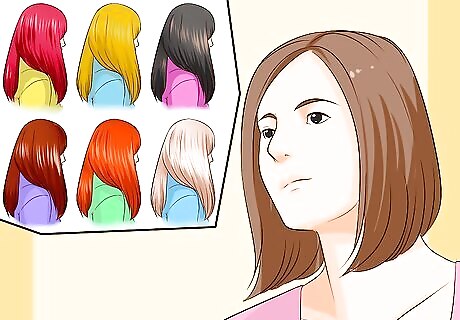
Consider coloring your hair. Logically, your natural hair color should match your skin tone quite well, but coloring your hair can be a great way to make your eyes pop or add a little extra excitement to your over all look. As with clothing colours, you’ll want to select your hair color based on your skin tone (i.e. warm or cool). If you have a cool skin tone, you can go with dark, “harsher” shades like black or, if you're feeling adventurous, blue. If you have a warm skin tone, you’re better off sticking with earthier shades like red, copper, or a rich, warm brown. If you can afford it, always get your hair professionally colored. This way, you can consult the stylist on what he or she thinks will work best with your skin tone, and in general the quality of the products is higher, so you’ll likely cause less damage to your hair.
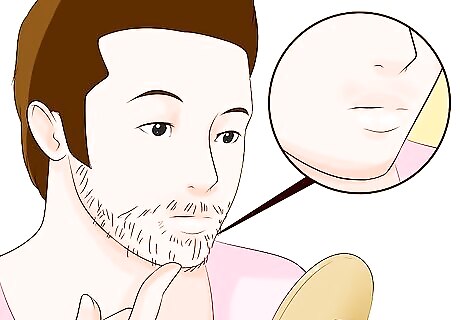
Groom your facial hair. If you are a female, chances are you will want to pluck your eyebrows and remove any hair elsewhere on your face (i.e. coming out of moles, moustache hair, hair on your chin). If you're a male, it can get a bit more elaborate, with eyebrow plucking, shaving and/or moustache and beard trimming. For men, facial shape is more relevant here. For example, men with a heart-shaped face might find it useful to grow a goatee or beard to help balance out the upper part of their face.
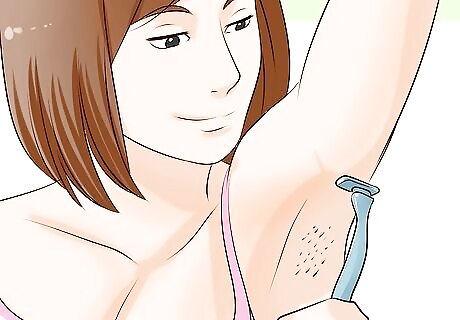
Shave other parts of your body as desired. It’s popular for women and some men to shave their legs and underarms, and to at least trim their pubic hair. If you are not comfortable with and/or do not wish to do these things, don’t do them! You are working to improve how you appear for yourself, and if you like the way you look with hairy legs, there is no reason to change that.
Exuding Confidence
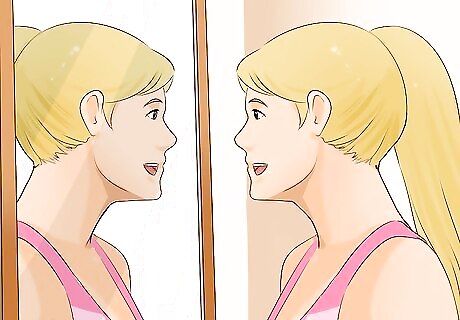
Practise positive self talk. A lot of us have negative voices telling us that we aren't good enough, that we’re stupid or unattractive. Don’t let these voices get you down. Acknowledge them, and counter them with positive self talk. Maybe one morning your clothes feel a bit tight and you think, “God I’m so fat. I’m so ugly. I can’t believe I’ve gained weight. I’m such a loser.” Think to yourself, “I acknowledge that negative response to my tight clothes. Yes, my clothes are a bit tight, but it’s not the end of the world. I'm not uglier because of it. I'm not stupid. I’m not a loser. My clothes are just a bit tight. That is all.” Then, counter with positive talk: “I was great in that meeting yesterday,” or, “I’m proud that I am trying to improve my self image.”
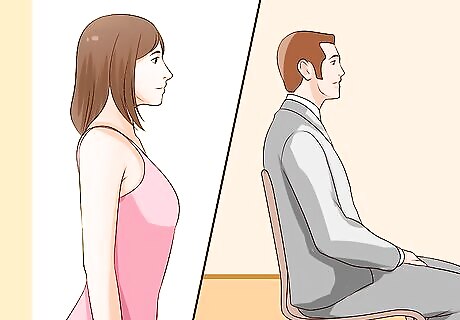
Ensure that you have good posture. Good posture means standing upright with a straight (but not rigidly straight) back, with your chin tilted ever so slightly down. Practise good posture by sitting upright even at your desk, and avoiding hunching.

Use positive body language. When speaking to others, there are things you can do to show that you are open to talking to them, and that you’re actively listening to them: Smile. Nothing crazy or too wide, but a light, relaxed smile will show that you’re happy to talk to them. Look at them with your chin angled down rather than up, so as not to appear as though you’re “looking down on them.” Avoid a full frontal display; instead, face them at a slight angle to avoid looking too dominant. Avoiding any closing off or compressing gestures — open palms, open eyes, high eyebrows, open (not compressed) lips.

Make eye contact. Don’t overdo it to the point that you’re staring or wide-eyed and crazy-looking, but do look into someone’s eyes when you’re talking to them and/or when they’re talking to you. Remember to blink!

Be charismatic. Being charismatic means being confident (but not cocky), interesting, optimistic, and an active listener. In a conversation, being charismatic means telling great stories, having a sense of humour, and, above all else, focusing on the other person. Ask them for advice, ask them follow-up questions when they tell you a story. Validate their opinions and don't be judgmental.
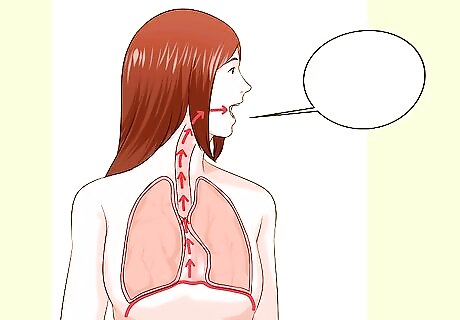
Speak with a strong voice. Studies have shown that higher, weaker voices are associated with submissiveness, whereas lower pitches are associated with social dominance. Ideally, you want to speak from your diaphragm in a strong and confident manner. There are various vocal levels, and each of them have different effects on the listener: nasal (high pitched, whiny), mouth (makes sound but is not very powerful; is easy to ignore), chest (used by many men and women, sounds pleasant, can generally maintain interest, nothing negative, just not the best), diaphragm voice (commands attention, most attractive, sounds strongest and most natural). To help you learn how to speak from your diaphragm, practise breathing deeply (imagine inflating your belly) rather than shallowly (into your chest). Not only will this help your voice sound better, it’ll also help you feel more relaxed and focused. If you really struggle with having confidence due to your voice, you might consider investing in a voice coach or at least looking up some vocal coaching videos online.

Have a great smile. When you smile, people will generally feel that you are more friendly and approachable. They key to having a great smile is to be genuine, which means smiling with your eyes, too. How you smile will depend on your situation — for example, you might smile with your teeth in a photo or when talking to people at a party, but prefer a less intense, closed-mouth smile if you’re trying to get someone’s attention from across the room.
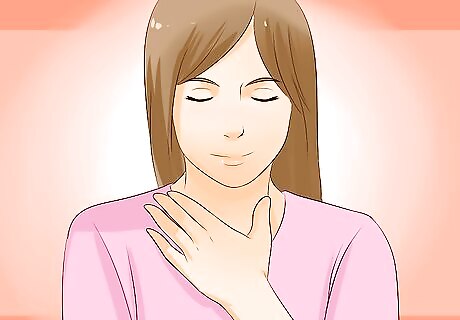
Know who you are and keep being you. Be comfortable with who you are and don’t change it. People who are confident and comfortable in their own skin have an attractiveness about them that no amount of styling, grooming, or fitness can match. When people know you’re consistent, and they know what to expect, they're more likely to want to be around you. If they know you're sometimes fun but sometimes a real downer, they might be nervous to approach you. As you work towards improving your appearance you might find that you seek out certain icons or gurus as models of what you want to be like. This isn't necessarily a bad thing, as long as you don’t wind up constantly comparing yourself to them and/or trying to be just like them. This is about becoming the best you that you can be — not the best mimic of someone else.












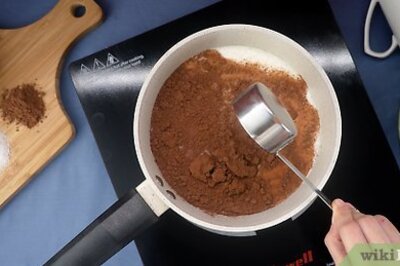

Comments
0 comment